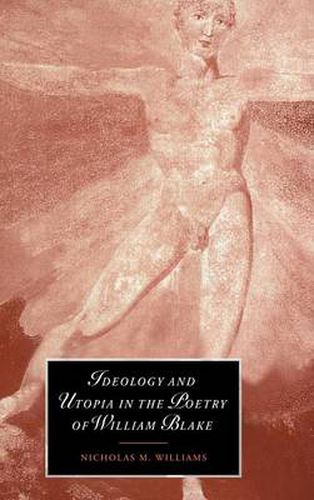Readings Newsletter
Become a Readings Member to make your shopping experience even easier.
Sign in or sign up for free!
You’re not far away from qualifying for FREE standard shipping within Australia
You’ve qualified for FREE standard shipping within Australia
The cart is loading…






Scholars have often drawn attention to William Blake’s unusual sensitivity to his social context. In this book Nicholas Williams situates Blake’s thought historically by showing how through the decades of a long and productive career Blake consistently responded to the ideas, writing, and art of contemporaries. Williams presents detailed readings of several of Blake’s major poems alongside Rousseau’s Emile, Wollstonecraft’s Vindication of the Rights of Woman, Paine’s Rights of Man, Burke’s Reflections on the Revolution in France, and Robert Owen’s Utopian experiments. In so doing, he offers revealing new insights into key Blake texts and draws attention to their inclusion of notions of social determinism, theories of ideology critique, and Utopian traditions. Williams argues that if we are truly to understand ideology as it relates to Blake, we must understand the practical situation in which the ideological Blake found himself. His study is a revealing commentary on the work of one of our most challenging poets.
$9.00 standard shipping within Australia
FREE standard shipping within Australia for orders over $100.00
Express & International shipping calculated at checkout
Scholars have often drawn attention to William Blake’s unusual sensitivity to his social context. In this book Nicholas Williams situates Blake’s thought historically by showing how through the decades of a long and productive career Blake consistently responded to the ideas, writing, and art of contemporaries. Williams presents detailed readings of several of Blake’s major poems alongside Rousseau’s Emile, Wollstonecraft’s Vindication of the Rights of Woman, Paine’s Rights of Man, Burke’s Reflections on the Revolution in France, and Robert Owen’s Utopian experiments. In so doing, he offers revealing new insights into key Blake texts and draws attention to their inclusion of notions of social determinism, theories of ideology critique, and Utopian traditions. Williams argues that if we are truly to understand ideology as it relates to Blake, we must understand the practical situation in which the ideological Blake found himself. His study is a revealing commentary on the work of one of our most challenging poets.